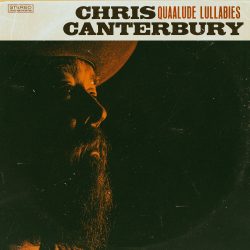Soulful country that despite its humble beginnings still manages to stir and move.
 “Try as I may, try as I might / To see the dark in the back of my eyes / There’s an army inside my head / And a monster under my bed,” growls Chris Canterbury on ‘The Devil, the Dealer and the Dark Side’, the opening track of his third studio album ‘Quaalude Lullabies’. Those opening words may sound grand, but while some artists see songwriting as a deep, sometimes even spiritual process, Canterbury sees it much more simply as a “straight-forward Saturday morning kitchen conversation.”
“Try as I may, try as I might / To see the dark in the back of my eyes / There’s an army inside my head / And a monster under my bed,” growls Chris Canterbury on ‘The Devil, the Dealer and the Dark Side’, the opening track of his third studio album ‘Quaalude Lullabies’. Those opening words may sound grand, but while some artists see songwriting as a deep, sometimes even spiritual process, Canterbury sees it much more simply as a “straight-forward Saturday morning kitchen conversation.”
‘Fall Apart’, a melancholic tale of a troubadour, fits right into that no nonsense take on things. “I hit my stride, on a lonesome highway / I cut my teeth, on a broken heart / When the stones come rolling my way / Hold me close, so I don’t fall apart,” he sings on the chorus, an extra layer added with some high, sweet harmonies. The only cover on the album is a faithful version of ‘Yellow Mama’, a song written by Will Kimbrough about the narrator’s last moments before execution. While other obvious favourable parallels can be made with that other gravel voiced singer of sad country songs with a soulful bent who also goes by Chris – namedly Stapleton – throughout, they really do come into sharp focus here with the similar subject matter of ‘Yellow Mama’ and Stapleton’s ‘Death Row’.
The production on the album is unsurprisingly minimal, but completely in line with the lo-fi aesthetic. “Folks back home still think I’m gonna make it / I wish like hell I still felt the same,” Canterbury laments on ‘Felt the Same’, a track that cleverly features his vocals over nothing but a guitar and a B3 organ, adding to that feel of the haunting regret over a life unlived. Every bit as lovely as its name suggests, ‘Sweet Maria’ is an ode to a gentle and easy love (“Hot sun falling in the western land / Tracing my thumb on the back of her hand / She drifts off to dream alone / I still take the long way home / She’s a lover and a fighter / But tonight, I just sit beside her and drive”), while ‘Over the Line’ is a lively affair that sees Canterbury still with driving on his mind (“Eighteen wheels, white Freightliner / Texarkana to Carolina / Rolling on, one last time / Drive me home, take me over the line”).
‘Back on the Pills’ is a stirring standout track, a sad look at someone who regretfully cannot kick their habit, even as they know it to be destructive: “Father forgive me, I know I’ve sinned / I’m well aware of the shape that I’m in / My soul’s as black as asphalt that sits beneath my wheels / I’m down to my last dollar, and back on the pills”.
“He’s a kitchen table poet / He’s a danger with a phrase / He’s a rounder and a founder of a once-forgotten age / His words flow like whiskey through the fibers of the page / But he’s just a kitchen table poet / You’ll never know his name,” sings Canterbury on ‘Kitchen Table Poet’, neatly summing up everything he, and this album, is about. And while his songs may originate from unassuming beginnings, you should definitely take time to know his name.


